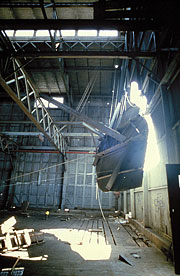Gordon Matta-Clark
Thirty years ago and one block from the site of this exhibition, Gordon Matta-Clark created one of his most important works, turning an abandoned Hudson pier warehouse into a “sun-and-water temple” that he called Day’s End. During the summer of 1975, Matta-Clark made a series of large cuts into a 600-ft long metal hangar on Pier 52 that had once belonged to the Baltimore and Ohio Railroad Company. Removing sections of the floor and ceiling, along with portions of the western and southern sides of the building, the artist exposed the river and sky, creating a changing sculpture of light out of a structure the city had largely abandoned.
Though not his first use of a Hudson pier—others included Untitled Performance (1971) and Pier In/Out (1973)—Day’s Passing, as the work was also known, incurred the wrath of the law. Matta-Clark’s opening event was shut down by the police, and dock authorities immediately locked the warehouse. The artist had hoped to let visitors in twice a week during the fall of 1975, but he soon found himself facing an arrest warrant and the threat of a million-dollar lawsuit. After leaving the country, Matta-Clark argued that he had created an indoor park, beautifying a decrepit space. The claims were eventually dropped.
This film—or rather, the filing for a film permit by two of Matta-Clark’s friends—seems to have been what tipped off the authorities. Though stuck in a confiscated and inaccessible state, Day’s End survived longer than many of his other works. A quick walk from the exhibition to the end of Gansevoort Street brings you to Pier 52, which survives today as a Department of Sanitation parking lot. ��������������
����

Documentation of Day’s End/Pier 52, 1975����


